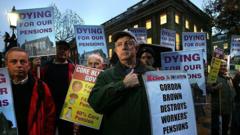Could Passengers Be Rescued from a Stuck Train With No Air Conditioning?

Understanding the Risks of Heatwaves: A Comprehensive Guide
Heatwaves are becoming increasingly common across the globe, and their effects can be severe, especially in urban areas. As temperatures soar, incidents such as overcrowded public transport, medical emergencies, and increased health risks for vulnerable populations come to the forefront. The recent reports of passengers jumping from overcrowded trains during a heatwave highlight the urgent need for awareness, preparation, and community support during these extreme weather events. In this article, we will explore the implications of heatwaves, how they affect public health and safety, and what measures can be taken to mitigate their impact.
What is a Heatwave?
A heatwave is typically defined as a prolonged period of excessively hot weather, which may be accompanied by high humidity. The UK Health Security Agency (UKHSA) defines heatwaves based on temperature thresholds, which can vary by region. For example, temperatures exceeding 30°C (86°F) in many areas are often considered a heatwave in the UK.
Understanding Temperature Records
Recent years have seen record-breaking temperatures, with the UK hitting highs of 34°C. Historical data shows that the June record reached 35.6°C in 1976, a benchmark that highlights how climate change is influencing weather patterns. The implications of these rising temperatures extend beyond mere discomfort; they pose serious health risks.
The Health Risks Associated with Heatwaves
Heatwaves can lead to a variety of health issues, particularly for vulnerable populations. The UKHSA reports that more than 10,000 people died prematurely due to summer heatwaves between 2020 and 2024. This alarming statistic underscores the importance of understanding the health risks associated with extreme heat.
Who is Most at Risk?
- Older Adults: Seniors are particularly vulnerable due to age-related physiological changes and potential pre-existing health conditions.
- People with Pre-existing Health Conditions: Individuals with chronic illnesses, heart conditions, or respiratory issues may experience exacerbated symptoms during heatwaves.
- Children: Young children are less able to regulate their body temperature compared to adults, making them susceptible to heat-related illnesses.
- Low-Income Communities: Limited access to air conditioning and healthcare resources can exacerbate the risks for those living in lower-income neighborhoods.
Common Health Issues During Heatwaves
During heatwaves, several health issues can arise:
- Heat Exhaustion: Symptoms include heavy sweating, weakness, dizziness, nausea, and headache.
- Heat Stroke: A more severe condition characterized by a high body temperature (above 40°C), confusion, and can be life-threatening without prompt treatment.
- Dehydration: Excessive heat can lead to significant fluid loss, causing dehydration, which can lead to serious complications.
Public Transport and Heatwaves: A Case Study
Extreme heat can exacerbate existing issues in public transport systems. The recent incident where passengers were forced to jump from an overcrowded train heading to Brighton illustrates the challenges faced during heatwaves. Overcrowded services can lead to a 'medical accident waiting to happen,' as passengers struggle to cope with high temperatures in enclosed spaces.
How Public Transport Services Can Prepare
Transport authorities must take proactive steps to manage services during heatwaves:
- Increase Services: Adding more trains or buses can help alleviate overcrowding, ensuring that passengers do not have to endure extreme heat in confined spaces.
- Provide Clear Communication: Keeping passengers informed about delays, service changes, and safety measures is essential.
- Implement Cooling Measures: Ensuring that public transport vehicles are well-ventilated or air-conditioned can help prevent heat-related health issues.
Community Support and Personal Precautions
As heatwaves become more frequent, community support and individual precautions are crucial in mitigating risks. Dr. Agostinho Sousa emphasizes the importance of checking on vulnerable individuals during extreme heat. Here are some practical steps individuals can take:
Personal Precautions
- Stay Hydrated: Drink plenty of water and avoid alcohol and caffeine, which can lead to dehydration.
- Limit Outdoor Activities: Try to stay indoors during the hottest parts of the day, usually between 11 a.m. and 4 p.m.
- Wear Appropriate Clothing: Lightweight, loose-fitting clothing can help keep your body cool.
- Use Fans and Air Conditioning: If available, use fans or air conditioning to regulate indoor temperatures.
- Check on Neighbors: Reach out to elderly or vulnerable neighbors to ensure they are safe and comfortable.
Government and Organizational Responses
Governments and health organizations play a vital role in responding to heatwaves. The UKHSA has issued amber heat-health alerts to warn citizens about the dangers of extreme heat. These alerts are essential for raising awareness and prompting individuals to take necessary precautions.
Public Health Campaigns
Public health campaigns focused on educating the population about the risks of heatwaves can significantly reduce heat-related illnesses. Key messages include:
- Recognizing the signs of heat exhaustion and heat stroke.
- Understanding the importance of hydration.
- Learning how to create a cool environment at home.
Looking Ahead: Preparing for Future Heatwaves
As climate change continues to impact weather patterns, heatwaves are likely to become more common and severe. Preparing for these events is essential for minimizing health risks and ensuring public safety. Here are some strategies for individuals and communities to consider:
Long-term Strategies for Heatwave Preparedness
- Urban Planning: Cities can implement green spaces, shade structures, and reflective materials in construction to reduce urban heat islands.
- Community Cooling Centers: Establishing designated areas with air conditioning can provide relief for those without access to cooling at home.
- Emergency Response Plans: Local governments should develop and disseminate plans for heat emergencies, including transportation options for vulnerable populations.
Conclusion
Heatwaves present significant challenges to public health and safety. From overcrowded public transport to increased health risks for vulnerable populations, the implications are far-reaching. By understanding the risks and taking proactive measures, individuals, communities, and authorities can work together to mitigate the impact of extreme heat. It is crucial to stay informed, support one another, and prepare for the increasing likelihood of heatwaves in the future.
FAQs
What should I do if I feel overheated during a heatwave?
If you feel overheated, move to a cooler area, drink water, and remove any unnecessary clothing. If symptoms persist, seek medical attention.
How can I help vulnerable neighbors during a heatwave?
Check on them regularly, offer to bring them water or food, and encourage them to stay in cool areas. If they have health conditions, remind them to follow their doctor's advice.
Are there government resources available for heatwave preparedness?
Yes, local governments often provide resources and information about heatwave preparedness, including public health alerts and cooling center locations.
As we face an uncertain future with more frequent heatwaves, how will you prepare for the next one? #HeatwavePreparedness #PublicHealth #ClimateChange
Published: 2025-06-21 17:00:00 | Category: News



